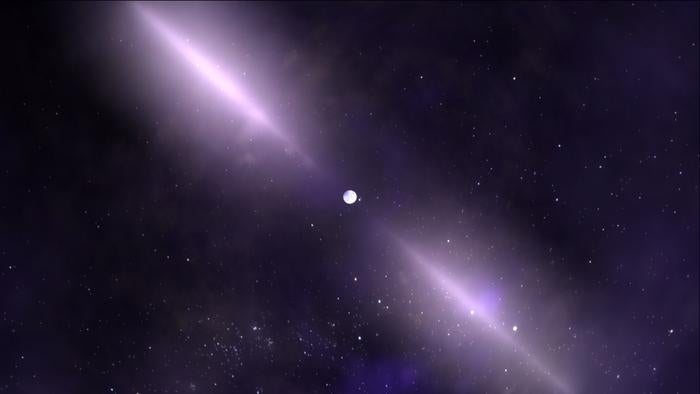Scientists find entirely new kind of gravitational wave in unprecedented breakthrough
Findings could bring a new era in understanding the universe, scientists say

Your support helps us to tell the story
From reproductive rights to climate change to Big Tech, The Independent is on the ground when the story is developing. Whether it's investigating the financials of Elon Musk's pro-Trump PAC or producing our latest documentary, 'The A Word', which shines a light on the American women fighting for reproductive rights, we know how important it is to parse out the facts from the messaging.
At such a critical moment in US history, we need reporters on the ground. Your donation allows us to keep sending journalists to speak to both sides of the story.
The Independent is trusted by Americans across the entire political spectrum. And unlike many other quality news outlets, we choose not to lock Americans out of our reporting and analysis with paywalls. We believe quality journalism should be available to everyone, paid for by those who can afford it.
Your support makes all the difference.Scientists have “heard” a chorus of gravitational waves rippling through the universe, in what they say is an unprecedented finding that could fundamentally change our understanding of the universe.
The discovery, described in a range of newly published journal papers, suggests that spacetime is being rocked by intensely powerful gravitational waves all the time. Those waves carry a million times more energy than the one-off bursts of gravitational waves that were detected from a black hole and were themselves hailed as a major breakthrough in our understanding of the universe.
The new results suggest that everything is being slowly shrunk and expanded by a new kind of gravitational wave as they pass through our galaxy. Scientists describe it as being akin to hearing a “symphony” of waves echoing through the universe.
“It’s like a choir, with all these supermassive black hole pairs chiming in at different frequencies,” said Chiara Mingarelli, a scientist who worked on the new findings while an associate research scientist at the Flatiron Institute’s Center for Computational Astrophysics. “This is the first-ever evidence for the gravitational wave background. We’ve opened a new window of observation on the universe.”
The new findings have been described in a range of journal articles, published in different academic journals. The research is the result of 25 years of observations from six of the world’s most sensitive radio telescopes, and have been simultaneously published by different collaborations across the world.
The findings are not only notable in themselves. They also offer the opportunity to find out some of the universe’s secrets, since they can be used to find information about the binary black holes that form when galaxies merge, for instance.
“These results signify the beginning of an exciting journey into the Universe, where we aim to unravel its mysteries,” Michael Keith, a lecturer at Jodrell Bank Centre for Astrophysics, UK, and contributor to one of the new studies, published in Astronomy and Astrophysics. “After decades of tireless work by hundreds of astronomers and physicists worldwide, we are finally detecting the long-awaited signature of gravitational waves originating from the distant Universe.”
Scientists made the discovery by analysing observations of pulsars, which are extinguished stars that can be used as reliable clocks in the distant universe. By bringing together such a large amount of detailed data, researchers were able to measure those pulsars with very high accuracy, allowing them to measure gravitational waves at a far larger scale than using detectors on Earth.
“Pulsars are excellent natural clocks. We exploit the remarkable regularity of their signals to detect subtle changes in their rhythm, enabling us to perceive the minute stretching and squeezing of space-time caused by gravitational waves originating from the far reaches of the Universe,” said David Champion, a senior scientist at the MPIfR in Bonn, Germany, and contributor to the study, in a statement.
For now, researchers are only able to “hear” the vast choir, rather than the individual pulsars that make up its singers. But together they are much louder than expected, meaning that there may be more or more heavy supermassive black holes to be found in the universe.
Join our commenting forum
Join thought-provoking conversations, follow other Independent readers and see their replies
Comments